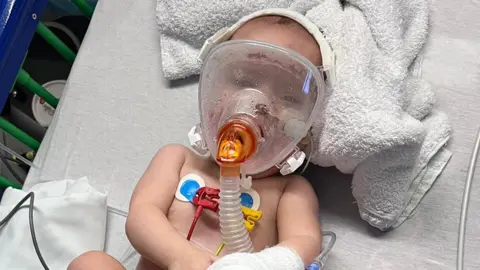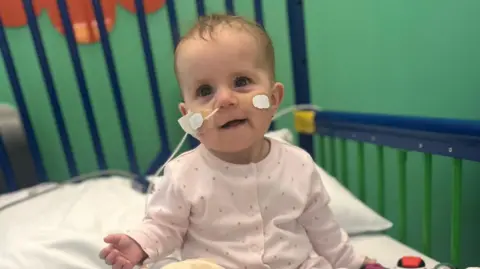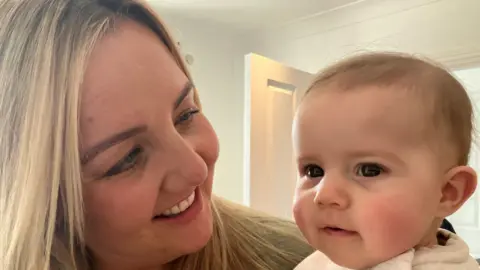Ill baby's mum urges pregnant women to get RSV jab
 Supplied
SuppliedThe mother of a baby girl who was seriously ill in hospital with a respiratory virus is urging pregnant women to take up a vaccination against it.
Isla, who is nine months old, spent five days in the high dependency unit at King's Mill Hospital in November with respiratory syncytial virus (RSV).
Two months earlier, the NHS started offering women in England, Wales and Northern Ireland who are at least 28 weeks pregnant an RSV vaccination to protect their babies against the virus.
Isla's mother Jessica, from Clay Cross in Derbyshire, said it was not available when she was pregnant, but said: "If I knew then what I know now, I would have had the vaccine, 100%."
'Very, very frightening'
Talking about Isla's nine-day hospital stay, Jessica said: "It was day three when she really started to deteriorate and ended up in the high dependency unit.
"If it wasn't for her tolerating the machines she was on, she would have ended up being intubated."
The 30-year-old said Isla was treated with oxygen therapy.
She added: "I never thought in a million years I would ever be a parent to a daughter who's that poorly."
Jessica said Isla was "struggling to breathe, gone off her food, she just wasn't herself - not lively, nothing".
"The machines that she had and masks she was on - there was no life in her," she added.
Isla's father Mark, 40, said: "To see your daughter with tubes and a mask on, and they're telling us if she doesn't improve, she will be sent off to intensive care, was very, very frightening."
 Supplied
SuppliedJust before Christmas - on 18 December - Isla was re-admitted to hospital with bronchiolitis, a common chest infection that affects babies and children under the age of two.
She returned home after five days and is now doing well.
Ada Lapite, a vaccination nurse at King's Mill Hospital, said the RSV vaccination was recommended for women between 28 and 36 weeks of pregnancy.
She said: "That is because the antibodies have plenty of time to produce and then transfer through the placenta on to the baby to keep baby safe."
The RSV vaccination was also introduced to adults aged 75 to 79, following a similar scheme in Scotland.
 Supplied
Supplied
What is respiratory syncytial virus (RSV)?
RSV infections are "very common", according to the NHS. Almost all children get them at least once before they are two years of age.
In babies, RSV is a common cause of bronchiolitis. This can cause breathing problems and may need to be treated in hospital.
Most people only get cold-like symptoms, such as a runny nose, cough, sneezing and tiredness. Babies with RSV may also be irritable and feed less than usual.
If RSV leads to a more serious infection, it may also cause shortness of breath, wheezing or loss of appetite.

Dr Suzi McFall, from NHS England, said: "Everyone knows about flu and Covid, but fewer people know about RSV.
"With RSV, we particularly worry about really young babies in their first six months of life, and also the elderly who can get really sick with RSV."
She added in the first week of 2025, 75 children were in hospital a day across England with RSV.
However, the vaccine uptake for the Midlands was only about 40% of women.
Dr McFall added: "It's so important to get that vaccine to protect your newborn child.
"Anyone who has been on a paediatric ward in a hospital will know, particularly at this time of year, there are so many young babies that are suffering with RSV."
Follow BBC Derby on Facebook, on X, or on Instagram. Send your story ideas to [email protected] or via WhatsApp on 0808 100 2210.
